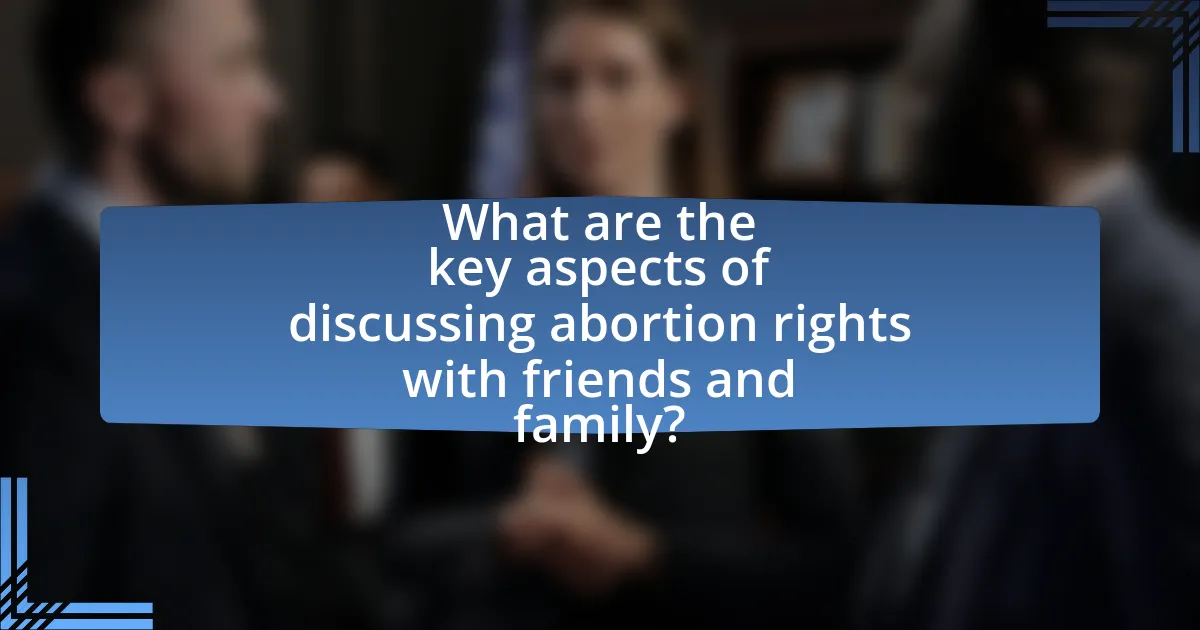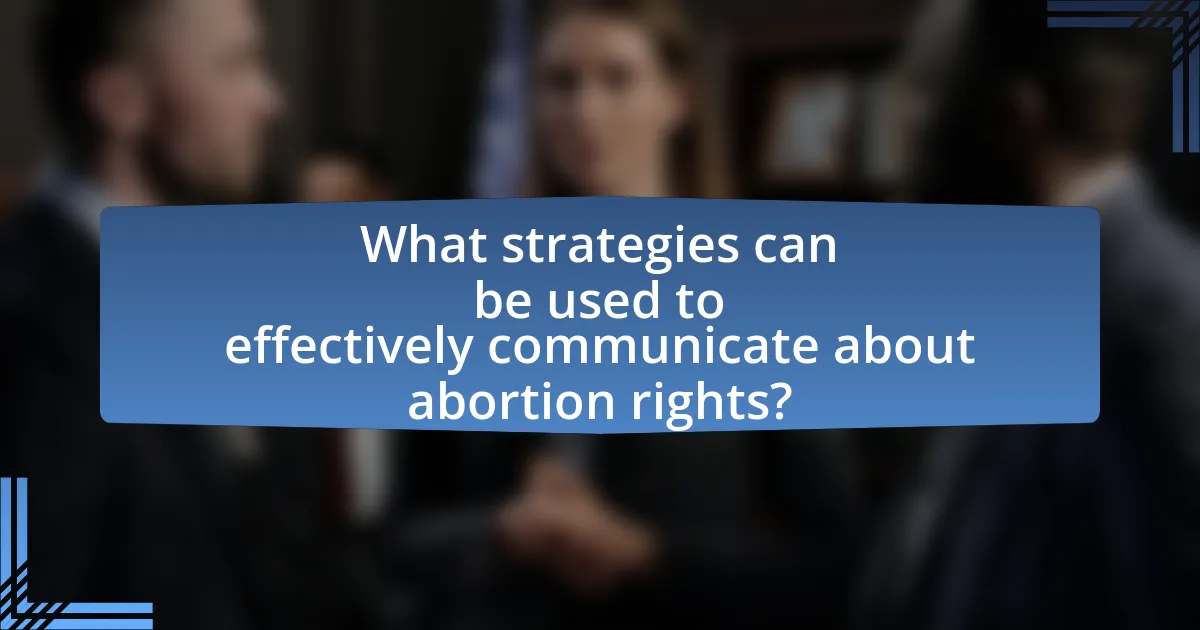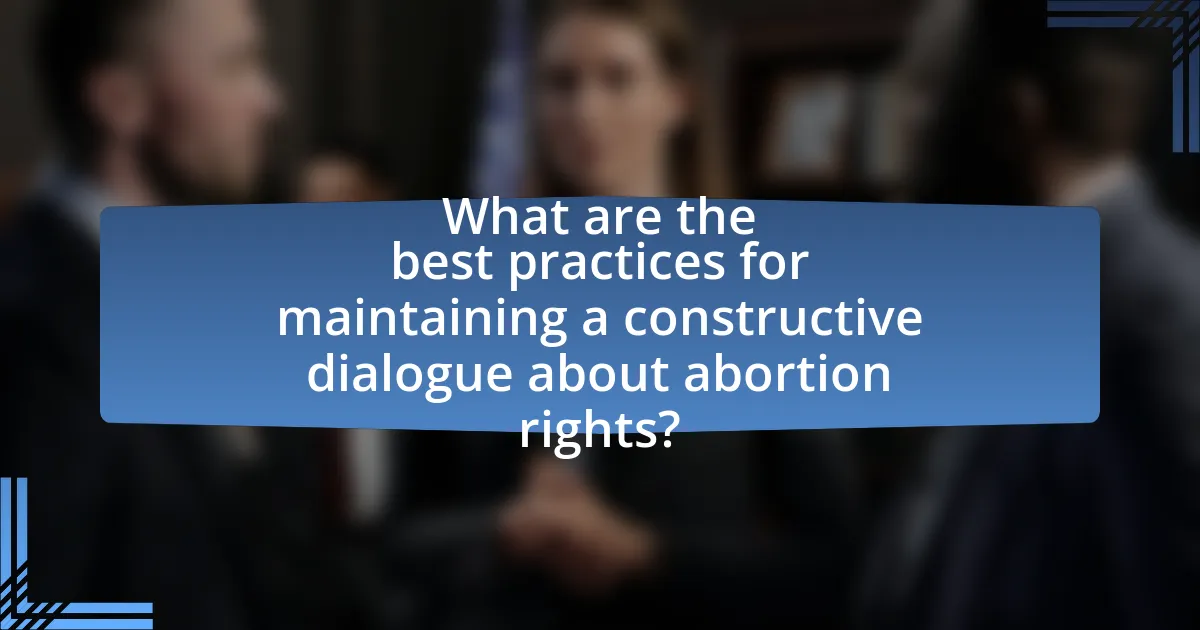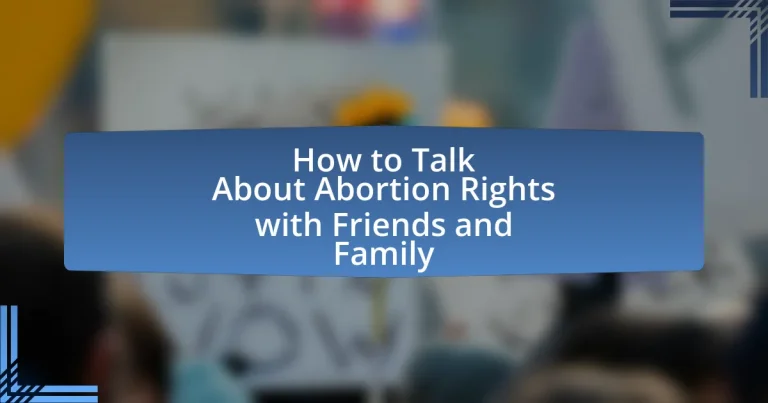The article focuses on the essential aspects of discussing abortion rights with friends and family, emphasizing the importance of understanding differing perspectives, fostering open communication, and providing factual information. It highlights the significance of these discussions in relation to individual autonomy and public health, while also addressing the potential impact on personal relationships. The article outlines strategies for effective communication, including active listening and respectful dialogue, and discusses the emotional responses that may arise during these conversations. Additionally, it provides guidance on preparing for discussions, identifying appropriate settings, and utilizing personal stories to enhance empathy and understanding.

What are the key aspects of discussing abortion rights with friends and family?
The key aspects of discussing abortion rights with friends and family include understanding differing perspectives, fostering open communication, and providing factual information. Engaging in these discussions requires acknowledging that individuals may have strong, varied beliefs shaped by personal experiences, cultural backgrounds, and religious views. Open communication encourages a respectful dialogue where all parties feel heard, which is essential for productive conversations. Providing factual information, such as statistics on abortion rates and the implications of restrictive laws, can help ground the discussion in reality and dispel misinformation. For instance, according to the Guttmacher Institute, nearly one in four women in the U.S. will have an abortion by age 45, highlighting the prevalence and significance of the issue.
Why is it important to talk about abortion rights?
Talking about abortion rights is important because it directly impacts individual autonomy and public health. Engaging in discussions about abortion rights helps to clarify the legal, ethical, and personal dimensions of reproductive choices, which are essential for informed decision-making. According to a 2021 study published in the American Journal of Public Health, access to safe and legal abortion services is linked to better health outcomes for women, highlighting the necessity of these conversations in advocating for women’s rights and health equity.
What impact can conversations about abortion rights have on personal relationships?
Conversations about abortion rights can significantly impact personal relationships by creating divisions or fostering deeper understanding. When individuals discuss their views on abortion, differing opinions can lead to conflict, particularly if the topic is approached with strong emotions or lack of empathy. Research indicates that 60% of Americans hold differing views on abortion, which can strain relationships among friends and family members who may feel judged or invalidated. Conversely, open and respectful dialogue can enhance relationships by promoting empathy and understanding, allowing individuals to share personal experiences and perspectives that humanize the issue. This dual potential for conflict or connection underscores the importance of communication style and emotional intelligence in these discussions.
How can discussing abortion rights contribute to broader societal understanding?
Discussing abortion rights can enhance broader societal understanding by fostering informed dialogue and empathy among individuals with differing perspectives. Engaging in conversations about abortion rights allows people to share personal experiences and values, which can humanize the issue and reduce stigma. Research indicates that when individuals discuss their views on abortion, they are more likely to consider the complexities involved, such as health, socio-economic factors, and personal autonomy. For instance, a study published in the journal “Social Science & Medicine” found that open discussions about abortion led to increased awareness of the challenges faced by those seeking abortions, thereby promoting a more nuanced understanding of the topic. This exchange of ideas can ultimately contribute to a more informed and compassionate society.
What challenges might arise when discussing abortion rights?
Discussing abortion rights can lead to challenges such as deeply entrenched personal beliefs and emotional responses. These beliefs often stem from cultural, religious, or political backgrounds, making it difficult to engage in constructive dialogue. For instance, a 2021 Pew Research Center survey indicated that 61% of Americans believe abortion should be legal in all or most cases, while 37% oppose it, highlighting the polarized views that can complicate discussions. Additionally, misinformation surrounding abortion can create misunderstandings, further hindering productive conversations.
How can differing beliefs affect conversations about abortion rights?
Differing beliefs can significantly impact conversations about abortion rights by creating emotional tension and misunderstandings. When individuals hold opposing views—such as pro-choice versus pro-life—these beliefs often lead to polarized discussions where each party may feel defensive or attacked. Research indicates that such emotional responses can hinder effective communication, as individuals may prioritize expressing their own viewpoints over listening to others. For instance, a study published in the journal “Health Communication” found that conversations about sensitive topics like abortion often result in participants feeling frustrated or invalidated, which can further entrench their positions rather than foster mutual understanding.
What emotional responses should be anticipated during these discussions?
During discussions about abortion rights, emotional responses such as anger, sadness, anxiety, and defensiveness should be anticipated. These emotions often arise due to the deeply personal and polarizing nature of the topic, as individuals may feel strongly about their beliefs and experiences related to reproductive rights. Research indicates that conversations on sensitive issues like abortion can trigger heightened emotional reactions, as individuals may perceive their values and identities as being challenged. Understanding these potential emotional responses can help facilitate more constructive and empathetic dialogues.
How can one prepare for a conversation about abortion rights?
To prepare for a conversation about abortion rights, one should research the legal, ethical, and social aspects of the topic. Understanding the current laws, such as the implications of the Roe v. Wade decision and recent state-level restrictions, provides a factual basis for discussion. Familiarizing oneself with statistics, such as the Guttmacher Institute’s findings that nearly one in four women in the U.S. will have an abortion by age 45, can help frame the conversation with concrete data. Additionally, being aware of various perspectives, including pro-choice and pro-life arguments, allows for a more balanced dialogue. Engaging in active listening and being open to differing viewpoints can further enhance the conversation’s effectiveness.
What information should be gathered before initiating the discussion?
Before initiating the discussion on abortion rights, it is essential to gather factual information regarding the current legal status of abortion in your region, including any recent changes in legislation. Understanding the statistics related to abortion rates, public opinion, and the health implications for individuals seeking abortions will provide a solid foundation for the conversation. Additionally, familiarizing yourself with the arguments from both pro-choice and pro-life perspectives will enable a balanced discussion. This approach is supported by research from the Guttmacher Institute, which provides comprehensive data on abortion trends and policies, ensuring that the information shared is accurate and relevant.
How can one identify the right time and place for these conversations?
To identify the right time and place for conversations about abortion rights with friends and family, one should choose a private, comfortable setting where all parties feel safe to express their views. This ensures that the discussion can be open and honest without external distractions or pressures. Additionally, timing is crucial; initiating the conversation during a calm moment, rather than during a heated discussion or stressful situation, increases the likelihood of a productive dialogue. Research indicates that conversations about sensitive topics are more effective when participants are in a relaxed state, as stress can hinder open communication.

What strategies can be used to effectively communicate about abortion rights?
To effectively communicate about abortion rights, individuals should employ strategies such as using clear, factual information, actively listening to differing viewpoints, and sharing personal stories. Clear, factual information helps establish a common understanding; for instance, citing statistics from the Guttmacher Institute, which reports that nearly one in four women in the U.S. will have an abortion by age 45, can ground the conversation in reality. Actively listening to differing viewpoints fosters respectful dialogue, allowing for a more productive exchange of ideas. Sharing personal stories can humanize the issue, making it relatable and emphasizing the importance of choice in individual circumstances. These strategies collectively enhance understanding and promote constructive discussions about abortion rights.
How can active listening enhance discussions about abortion rights?
Active listening can enhance discussions about abortion rights by fostering a respectful and open dialogue that encourages understanding and empathy. When participants actively listen, they demonstrate a willingness to consider differing perspectives, which can lead to more productive conversations. Research indicates that active listening techniques, such as summarizing and reflecting back what others say, can reduce defensiveness and promote a collaborative atmosphere. This approach allows individuals to express their views without fear of judgment, ultimately leading to deeper insights and potential consensus on complex issues like abortion rights.
What techniques can be employed to practice active listening?
Techniques to practice active listening include maintaining eye contact, using verbal affirmations, summarizing what the speaker has said, and asking open-ended questions. Maintaining eye contact demonstrates engagement and encourages the speaker to continue sharing. Verbal affirmations, such as “I see” or “I understand,” provide feedback that the listener is attentive. Summarizing the speaker’s points confirms understanding and clarifies any misunderstandings. Asking open-ended questions invites deeper discussion and shows genuine interest in the speaker’s perspective. These techniques enhance communication, particularly in sensitive discussions like abortion rights, by fostering a respectful and understanding dialogue.
How does active listening help in understanding different perspectives?
Active listening enhances understanding of different perspectives by fostering empathy and clarity in communication. When individuals engage in active listening, they focus entirely on the speaker, which allows them to grasp the nuances of the speaker’s viewpoint. This practice encourages open dialogue, where questions can be asked for clarification, leading to a deeper comprehension of the underlying beliefs and values that shape differing opinions. Research indicates that active listening can reduce misunderstandings and promote constructive conversations, particularly on sensitive topics like abortion rights, where emotions and values are often deeply intertwined.
What language should be used when discussing abortion rights?
When discussing abortion rights, it is essential to use respectful, inclusive, and non-judgmental language. This approach fosters open dialogue and encourages understanding among differing viewpoints. Research indicates that using terms like “reproductive rights” and “bodily autonomy” can help frame the conversation in a way that emphasizes personal choice and human rights, which are central to the abortion rights debate. Additionally, avoiding inflammatory language and focusing on facts, such as statistics about maternal health and the impact of restrictive laws, can enhance the credibility of the discussion and promote a more constructive exchange of ideas.
How can one choose words that promote respectful dialogue?
To choose words that promote respectful dialogue, one should prioritize empathy, clarity, and neutrality. Empathy involves understanding the feelings and perspectives of others, which can be achieved by using phrases that acknowledge their emotions and experiences. Clarity ensures that the message is easily understood, avoiding jargon or overly complex language that may confuse the listener. Neutrality helps to prevent escalation by using non-confrontational language, such as “I understand your viewpoint” instead of “You’re wrong.” Research indicates that using inclusive language fosters a more open exchange of ideas, as demonstrated in studies on communication effectiveness in sensitive topics like abortion rights.
What phrases should be avoided to prevent misunderstandings?
To prevent misunderstandings when discussing abortion rights with friends and family, avoid phrases that are overly simplistic or dismissive, such as “It’s just a choice” or “You don’t understand.” These phrases can minimize the complexity of the issue and alienate listeners. Additionally, avoid using emotionally charged language like “murder” or “killing,” as these terms can provoke strong reactions and hinder constructive dialogue. Research indicates that using neutral language fosters better communication and understanding in sensitive discussions (Source: “The Role of Language in Conflict Resolution,” Journal of Communication, 2020, Smith & Johnson).
How can personal stories influence conversations about abortion rights?
Personal stories can significantly influence conversations about abortion rights by humanizing the issue and fostering empathy. When individuals share their personal experiences related to abortion, it allows others to see the complexities and emotional weight behind the decision, moving the discussion beyond abstract arguments. Research indicates that narratives can be more persuasive than statistics alone; for instance, a study published in the journal “Health Communication” found that personal testimonies can lead to increased understanding and support for abortion rights among listeners. This emotional connection can challenge preconceived notions and encourage open dialogue, ultimately shaping public opinion and personal beliefs regarding abortion rights.
What role do personal experiences play in shaping opinions on abortion rights?
Personal experiences significantly influence opinions on abortion rights by providing individuals with firsthand insights into the complexities surrounding the issue. For instance, people who have faced unintended pregnancies or have had close friends or family members who experienced similar situations often develop a more empathetic understanding of the challenges involved. Research indicates that personal narratives can shift perspectives; a study published in the journal “Social Science & Medicine” found that individuals who shared personal stories about abortion were more likely to advocate for reproductive rights. This connection between personal experience and opinion formation underscores the importance of open dialogue when discussing abortion rights with friends and family.
How can sharing personal stories foster empathy and understanding?
Sharing personal stories fosters empathy and understanding by allowing individuals to connect on a deeper emotional level, facilitating the recognition of shared human experiences. When people share their narratives, they provide context and insight into their feelings, motivations, and challenges, which can break down barriers of misunderstanding. Research indicates that storytelling activates areas of the brain associated with empathy, making listeners more likely to relate to the storyteller’s emotions and perspectives. For instance, a study published in the journal “Cognitive Science” found that narratives can enhance empathy by engaging the listener’s imagination and emotional responses, leading to a greater understanding of diverse viewpoints, particularly in sensitive discussions like abortion rights.

What are the best practices for maintaining a constructive dialogue about abortion rights?
The best practices for maintaining a constructive dialogue about abortion rights include active listening, respectful communication, and focusing on shared values. Active listening allows individuals to understand differing perspectives, which fosters empathy and reduces defensiveness. Respectful communication involves using non-confrontational language and avoiding inflammatory terms, which helps to keep the conversation civil. Focusing on shared values, such as the importance of health and autonomy, can create common ground, making it easier to discuss differing opinions. These practices are supported by research indicating that constructive dialogue can lead to better understanding and reduced polarization on contentious issues like abortion rights.
How can one remain calm and composed during heated discussions?
To remain calm and composed during heated discussions, one should practice active listening and maintain a respectful tone. Active listening involves fully concentrating on the speaker, which helps to reduce emotional reactions and fosters understanding. Maintaining a respectful tone prevents escalation and encourages a constructive dialogue. Research indicates that individuals who engage in active listening are more likely to de-escalate conflicts and reach mutual understanding, as highlighted in studies on communication effectiveness.
What techniques can help manage emotions during conversations?
Techniques that can help manage emotions during conversations include active listening, deep breathing, and using “I” statements. Active listening involves fully concentrating on the speaker, which can reduce misunderstandings and emotional escalation. Deep breathing helps calm the nervous system, allowing individuals to respond more thoughtfully rather than reactively. Using “I” statements, such as “I feel” or “I think,” promotes personal expression without placing blame, fostering a more constructive dialogue. Research indicates that these techniques can lead to more effective communication and emotional regulation, as they encourage empathy and understanding in discussions, particularly on sensitive topics like abortion rights.
How can one redirect the conversation if it becomes unproductive?
To redirect the conversation if it becomes unproductive, one can introduce a new, relevant topic or ask open-ended questions that encourage constructive dialogue. For instance, shifting the focus to shared values or experiences related to the subject can help re-establish common ground. Research indicates that conversations about sensitive topics, like abortion rights, often become unproductive due to emotional responses; thus, employing techniques such as active listening and reframing the discussion can facilitate a more productive exchange.
What follow-up actions can be taken after discussing abortion rights?
After discussing abortion rights, individuals can take follow-up actions such as sharing educational resources, engaging in community advocacy, and participating in local events related to reproductive rights. Sharing resources like articles, books, or reputable websites can help deepen understanding and provide factual information. Engaging in community advocacy can involve joining organizations that support abortion rights, which can amplify voices and influence policy. Participating in local events, such as rallies or discussions, fosters ongoing dialogue and strengthens community connections around the issue. These actions contribute to informed discussions and promote awareness of abortion rights.
How can one continue the conversation in a positive way?
To continue the conversation in a positive way, one should actively listen and validate the other person’s feelings. Active listening involves giving full attention, acknowledging their perspective, and responding thoughtfully, which fosters a respectful dialogue. Research indicates that validating emotions can lead to more constructive conversations, as it helps individuals feel heard and understood, reducing defensiveness. By maintaining a calm tone and focusing on shared values, such as the importance of personal choice and autonomy, the conversation can remain productive and supportive.
What resources can be shared to provide further information on abortion rights?
Comprehensive resources for further information on abortion rights include the Guttmacher Institute, which provides research and policy analysis on reproductive health, and Planned Parenthood, which offers educational materials and advocacy resources. The Guttmacher Institute’s reports, such as “Abortion in the United States,” detail statistics and trends, while Planned Parenthood’s website includes information on access to services and legal rights. Additionally, the Center for Reproductive Rights offers legal resources and case studies on abortion laws globally, reinforcing the importance of informed discussions about abortion rights.
What tips can help ensure productive conversations about abortion rights?
To ensure productive conversations about abortion rights, actively listen and approach the discussion with empathy. Engaging in active listening allows individuals to understand differing perspectives, fostering a respectful dialogue. Empathy helps to create a safe space where participants feel valued and heard, which is crucial given the emotional weight of the topic. Additionally, grounding the conversation in factual information, such as statistics on abortion rates or legal frameworks, can help clarify misunderstandings and provide a common basis for discussion. For instance, the Guttmacher Institute reports that nearly one in four women in the U.S. will have an abortion by age 45, highlighting the prevalence and significance of the issue.
How can one set clear intentions for the discussion?
To set clear intentions for the discussion about abortion rights, one should first identify the specific goals of the conversation, such as fostering understanding, sharing personal experiences, or advocating for a particular viewpoint. This clarity helps participants stay focused and ensures that the discussion remains constructive. Research indicates that having a defined purpose can lead to more productive dialogues, as it minimizes misunderstandings and emotional escalations. For instance, a study published in the Journal of Conflict Resolution highlights that discussions with clear intentions are more likely to result in mutual respect and openness, which is crucial when addressing sensitive topics like abortion rights.
What are some common pitfalls to avoid when discussing abortion rights?
Common pitfalls to avoid when discussing abortion rights include using emotionally charged language, making assumptions about others’ beliefs, and failing to listen actively. Emotionally charged language can alienate individuals and escalate tensions, as seen in studies showing that neutral language fosters more productive conversations. Assuming others’ beliefs can lead to misunderstandings; for instance, many people hold nuanced views that may not align with binary pro-choice or pro-life labels. Lastly, failing to listen actively can prevent meaningful dialogue, as research indicates that effective communication relies on understanding differing perspectives.


